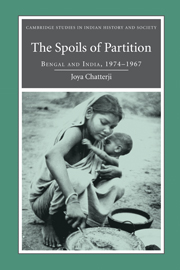Introduction
Published online by Cambridge University Press: 25 June 2009
Summary
In August 1947 the British quit their Indian empire, dividing it into two nations. As a part of that historic division, Bengal and the Punjab, the largest provinces of British India in which Muslims were a majority, were partitioned between the successor states of India and Pakistan. Roughly two-thirds of the territory of Bengal was carved out to create the province of East Bengal in Pakistan. Separated by more than a thousand miles from the rest of Pakistan, East Bengal later broke away from its dominant partner to become the sovereign nation of Bangladesh. The remaining third of the old Bengal, in the main territories lying to the west and north-west, became the state of West Bengal inside India.
Bengal's partition in 1947, its causes and the role of its Hindu elites in demanding and getting a homeland of their own in India are the subject of an earlier work by the author. The present book considers the enormous consequences of partition for West Bengal and for independent India. In the two decades after independence – twenty years of critical importance in India's history – the impact of partition proved to be more complex and far greater than scholars have hitherto recognised. Partition transformed Bengal and India yet, for the most part, the changes which flowed from partition were as unexpected as they were far-reaching. This study will seek to explain why.
- Type
- Chapter
- Information
- The Spoils of PartitionBengal and India, 1947–1967, pp. 1 - 16Publisher: Cambridge University PressPrint publication year: 2007



